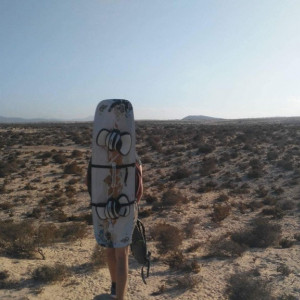How did you get started with remote work?
Interview with Harry, an IT Architect who works from home
I was planning a move from Pennsylvania to South Carolina and began looking for new job opportunities there. After my employer at the time found my active resume on Monster, we had a discussion and they decided to keep me on full time as a remote employee. That was in 2009—I've been working remotely full time ever since.
Harry has worked remotely for almost 10 years as a senior mobile, web and desktop developer—learn how he balances work with family.
Read full interview from Interview with Harry, an IT Architect who works from home.
Interview with Patryk, a Front-end Developer & UI Designer
For as long as I can remember, my parents have been running their own business - so to me, working a regular 9 to 5 job felt somehow unnatural.
I started out as a freelancer when I was studying at university.
At first, I mostly wanted to get commercial experience and build up a portfolio. At that time, I was still dreaming about joining a "Mad Men"-like agency and bringing huge campaigns to life.
But after a while, I realized that what I most enjoy is direct contact with customers - briefing them, understanding and solving the problems of their businesses, presenting and defending my work.
I also realized that working as a freelancer allows more freedom - you can work wherever and whenever you want. Since I enjoy traveling, the choice was easy.
I never really worked in an office, so there was no transition to make.
I started getting clients thanks to recommendations from my friends or from people I met during conferences.
Maybe those suited-up businessmen found me, 20-year-old kid in a T-shirt telling them how passionate I am about design & IT, adorable. 🐣
Patryk has learned that there is no reason to wait for the flow - once you start working, it will happen naturally.
Read full interview from Interview with Patryk, a Front-end Developer & UI Designer.
Interview with Chanell, a freelance writer and social media manager
I was working in communications for an educational nonprofit, and while I loved the work I was doing, I realized the brick and mortar office was not for me.
My commute was over an hour each way, co-worker distractions led to tasks taking a much longer time to be completed, and I wanted more freedom in being able to travel while working.
This realization led me to understand that remote work was better suited to my personality.
I began applying for remote work positions in digital marketing management, social media management, and content creation. The field was so competitive that my efforts were proving fruitless, so I figured that I would set up a profile on Upwork just to see what would happen.
I began marketing work I had already done for my current job, and I began to find my niche as a business management writer. I began to find freelance work while I was still at my full-time job. It was a lot of work, but it paved the way for me to make enough to leave within four months. A few clients took a chance on me and the rest is history.
I would offer up the following advice:
Don’t be afraid to pursue a different work style. It was difficult for me because the 9-to-5 brick and mortar work environment was all I knew. It was a risk to pursue something different. However, it turned out to be for my good in the long-run. You know yourself better than anyone, so feel confident in making the decision to go remote.
Be flexible! I originally had this idea that I was going to be a digital marketing/social media marketing associate for a remote company. Well, I quickly found out this was a very competitive field, and that I didn’t have the connections to pursue this fully. So, I ended up finding out that I could be just as successful writing (which I happened to enjoy even more).
Use social media! I have stumbled onto a lot of opportunities while searching different hashtags on Twitter, joining Facebook remote work groups, and keeping an eye on LinkedIn job postings. Job boards are great, but social media can be an awesome resource in finding the next gig.
I am truly grateful for the opportunity to work where I feel most comfortable. The beginning was a bit scary, but I have no regrets in starting on this journey. Remote work has allowed me to be even more productive than I was at an office. There are always late nights, but I would not have it any other way.
Chanell is a freelance writer working from Atlanta that writes about business management tips and video game entertainment threads.
Read full interview from Interview with Chanell, a freelance writer and social media manager.
Interview with Cameron, a designer who works remotely at a WordPress agency
I was working a more “normal” job during the week and moonlighting as a Freelance Designer on nights and weekends. I pulled lots of long nights fueled by coffee and punk rock until I had enough work coming in to jump into freelance full-time.
This lead to starting a small agency with a Developer friend which was a great opportunity for me to learn the business side of things including sales.
While freelance life was great in many ways, I also missed the steady paychecks and predictability of a normal job, so after 3 years of freelancing and running a business, I decided to start looking for a full-time remote job.
While attending an industry conference WordCamp Raleigh I met someone who worked for my current employer WebDevStudios. In a few weeks, I had applied for a remote position with them and been offered a job which I excitedly accepted! I've been working remotely with them for 3 years now.
Learn how Cameron started full-time remote work after trying freelancing and starting a digital agency.
Read full interview from Interview with Cameron, a designer who works remotely at a WordPress agency.
Interview with Jenna, a freelance writer who works remotely to help manage her health
To be honest, I feel like I was sort of pushed into working remotely as a freelancer because of my health problems. I was getting these stress-induced migraines frequently that made it dangerous to drive and impossible to get work done. And I wasn’t sleeping much either which of course wasn’t helping.
The office was full of migraine triggers like fluorescent lights, perfumes being sprayed indoors, a lot of noise, blue light, and the stress of the job. I got yelled at a lot because one of my main responsibilities was to diffuse difficult situations with customers. I tried to go outside, take frequent breaks, meditate in my car, just anything to get rid of that stress, but it wasn’t enough.
The attendance policy was really strict, and I had no FMLA protection left after a medical leave I’d taken earlier in the year. I was not at all willing to force myself to drive with a migraine – not only was the pain bad, but I get aura, which is severe brain fogginess and problems seeing, or hallucinations that are zigzags of light that go across my vision. Public transportation wasn’t an option and I wasn’t allowed to work from home. So, I kept missing work.
So then I was placed on a warning for missing too much work. I’d been trying to move into a lateral position that would allow me to work remotely – some of the available jobs involved work I’d already been doing in my current position so it should’ve been a no-brainer. But this company took months to fill any openings, and once I was placed on this verbal warning I was no longer allowed to move into other positions. For 6 months, or a year, I forget which, I was totally stuck. And if I’d missed 2 more days of work in that timeframe I’d lose my job.
It was really frustrating at the time because I’d been there for 3 years at this point, and they weren’t wiling to work with me at all or try to keep me employed. I felt disposable and realized that the stress of not having a steady paycheck was not as bad as the stress this job was causing me.
I considered trying to find a new job that was 100% remote but those jobs are few and far between and I know there is a ton of competition for them.
Plus I really wanted to control my hours so that I could rest as much as I needed to recover my health. I’d always wanted to be a writer and I’d been studying marketing for months at that point in the hopes of trying to freelance, and I also really didn’t want to get fired – I wanted to leave while it was still my choice even if it didn’t feel like much of a choice. So after a few attempts to quit and chickening out, I finally gave my notice and took the leap.
It was pretty scary to do that but I’m lucky to have a very supportive partner. And after a few months of rest, my migraines went from 3-4x weekly to 1x monthly or even less! I definitely feel like I made the right choice, and now that I’ve experienced the freedom that comes with working from home as a freelancer I don’t think I’ll ever be able to go back to a traditional job. I’m still recovering from the burnout I experienced from my old job, but I’m really looking forward to being able to travel and work from anywhere in the world.
I know a lot of employers are resistant to allowing remote work, but I think those types of companies are going to eventually be perceived as old-fashioned.
There’s so many people out there like me who have a hard time being in a regular office whether it’s because they’re introverted or have health problems (or both). Personally, I get way more work done when I’m at home than I ever would in a typical office environment.
Freelancing is hard and definitely not right for everyone, and remote jobs would create a lot of opportunities. I believe a lot of companies would benefit from allowing employees to work from home.
Jenna started working remotely after realizing her office job was causing health problems—now she works as a freelance writer and writes about self-improvement
Read full interview from Interview with Jenna, a freelance writer who works remotely to help manage her health.
Interview with Lily, an entrepreneur building VR conferencing for remote teams
My remote journey all started when I was hired as an IT consultant out of college. My first client requested that I be on site but I saw my senior team members work on-site part-time and work remotely the rest of the time. I learned how to work on teams with people who were out of state and in different time zones.
After I proved I was a trustworthy worker on that project, my boss said I could work from anywhere (as long as I was close to an airport). I decided to move to Detroit, MI to be closer to my family and boyfriend (now husband). I set up my “office” in my one bedroom apartment.
One of my favorite things to do was take my laptop and explore all the different coffee shops in the area.
It felt natural to switch to remote work since that was my company’s culture. People would get online around 8 AM their local time and work until 5 PM their local time. Hours were flexible but I still have a bit of anxiety when I think of my status light going to “away” for too long on IM. We were given tools for success like company phones and instant messenger apps.
Plus, I was still traveling a lot so I saw my team members in person on a regular basis.
Lily has almost a decade of remote work experience, now she's building the team collaboration tool of the future with Virtual Reality
Read full interview from Interview with Lily, an entrepreneur building VR conferencing for remote teams.
Interview with Dani and Luca, digital nomads who have mastered work and travel
We were already both contractors for clients that covered about 80 percent of our income. We were going to their office every day, but it was not essential to our work to be done.
We simply told them we wanted to switch to full remote, and after we guaranteed them our availability in their time zone, regardless of where in the world we’d be, and promised to keep up with the quality of our results, they agreed.
We put our home on rent and bought two tickets to Thailand. No remorse ever.
Dani and Luca have mastered the art of traveling while working—see their hacks & tips for thriving as digital nomads.
Read full interview from Interview with Dani and Luca, digital nomads who have mastered work and travel.
Interview with Alexandra Cote, a remote digital marketer and freelancer
I just always knew I wanted to work remotely. The thought of spending an extra 2-3 hours on the commute and getting ready for work was just life-draining to me.
So when I was offered a remote position, I had to say yes! I did have an in-office position before, but it was part-time, so it wasn't taking up too much of my time.
I've always heard excuses like "Why would they hire someone remotely?" from non-remote workers.
The reason why I got hired in the first place and why many teams are fully-distributed is because companies need access to the best talent pool out there.
Even if that means you'll be working with people across multiple time zones.
Alexandra juggles freelancing, a full-time remote job, YouTube, and Skillshare instructing. How does she manage it all? Find out in her interview.
Read full interview from Interview with Alexandra Cote, a remote digital marketer and freelancer.
Interview with Kristi, a CEO and remote team leader
I began working remotely back in 2013, first as a marketing consultant working with startups and universities, and then in a fulltime communications role with a large higher ed IT association.
I'd already spent six years in traditional brick-and-mortar jobs but was eager to break free from the four walls of an office--knowing full well that I could accomplish anything I was working on from anywhere I could use a laptop.
That was such a freeing feeling. I stayed in that role for two years before striking out on my own with a teammate whom I've known for decades. Now there are six of us.
Kristi is a CEO, remote work author, and speaker. In this interview, she shares the impact of new motherhood and remote team leadership on her work.
Read full interview from Interview with Kristi, a CEO and remote team leader.
Interview with Andrew, co-founder and CEO of Insured Nomads
Remote work has been a part of my modus operandi for over 15 years as my wife and I have taken turns in our professional development with various expatriate assignments and international opportunities. This situation has given me the freedom to take my work with me or pioneer new ventures from the road.
Andrew, co-founder, and CEO of Insured Nomads talks traveling while working, productivity tools, and the best advice he has received.
Read full interview from Interview with Andrew, co-founder and CEO of Insured Nomads.









